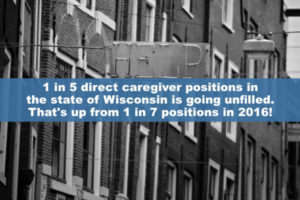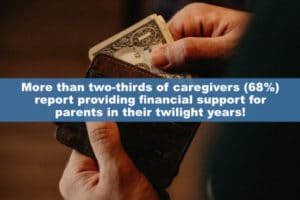Home Care
Who is Going to Pay for Your Funeral?

Who is Going to Pay for Your Funeral?
Asking who is going to pay for your funeral might seem like a silly question–you probably have money in savings, a vehicle, a house, even life insurance. There should be plenty of money to pay this bill, right?
The problem is, you are gone, so now who has access to your assets?
Your Power of Attorney ends at the moment of your death. How your assets will be distributed and who has authority will all be determined in the probate process in the next few months. So, who will come up with the funds now to pay for the funeral? Even life insurance does not pay out for some time once claim forms are submitted.
Just recently, I received a call from a La Crosse funeral home who wanted to know how to get in touch with the Wisconsin Funeral Trust. This is the organization that funeral directors set up to hold prepayments for funerals. The association chose to invest the funds very aggressively and now only has money to pay out 65% of what people deposited. The funeral home that called me was caring for two individuals who had passed, and the home was trying to determine how much money the trust actually has for them. They called me is because they found me in an internet search. (If you Google “funeral trust Wisconsin”, my website comes up.) They hoped I could either help them or direct them to the correct place.
This shortcoming of the state funeral trust is important to those planning ahead for their end-of-life needs. I am a long-term care planner and, as such, include protecting funds set aside for funerals as part of my work. I help people set aside funds for their funeral using a licensed trust company who specializes in just this. The company that I use for this purpose is a licensed and bonded insurance company, required by law to retain adequate funds to cover claims. There is no cost to set up such a trust and the funds deposited earn interest. These funds are available immediately at death, even before a death certificate has been produced, to pay all the bills in full.
There is another important reason to fund a funeral trust –many people need long term care in the years leading up to their death. This can cost as much as $50,000 to $90,000 per year or more. If they did not plan in advance and purchase long-term care insurance to cover these bills, they may have to apply for a welfare program called Medicaid to pay for their care. Medicaid is a payer of last resort and will only cover long-term care expenses once you have spent down everything you own (house, car, checking, savings) to under $2000. You must also cash in life insurance before Medicaid pays for long-term care. This balance is not enough to pay for a funeral.
Medicaid does allow you to set aside money for funeral expenses, but only in an irrevocable burial trust account. Setting these up for people who did not plan for long-term care expenses has become a large part of my work.
Death happens to everyone. Don’t leave the bills for this to your children. Make sure the money is there AND accessible to them when it is needed.
Long-term care happens to 70% of adults who make it to age 65. What is your plan to pay for this care when your health changes?
For answers to either of these predicaments, reach out to Romeo Raabe at www.TheLongTermCareGuy.com or call (920) 884-3030 to schedule a time to investigate solutions. There is never a cost to investigate.
Do You Want to Receive Home Care, but can’t afford it?

You’ve heard home care is too expensive. There are ways even if you do not have the money!
As you age, and fear that the time may come when you need help with day to day activities such as getting up, dressed, and preparing breakfast, do you worry how you might pay for such care?
You’ve heard it is expensive. You cannot afford this care or are not healthy enough to purchase Long-Term Care insurance. Perhaps you tried to purchase insurance but were turned down.
There are ways to get home care that your planner or insurance agent simply are not aware of, even if you do not have the money to pay for such care.
First, let’s look at what happens to most people. They need care and look into moving to an assisted living facility. Without the ability to pay for the rest of your life, many will say no and direct you to the dreaded nursing home who has to take you on the government welfare program called Medicaid. Assisted living does not have to accept this as they lose money on its meager reimbursement.
It seems like your only choices is to move into the nursing home, and sell your house and car and spend down all your money to less than $2000, and cash in your life insurance to qualify for Medicaid. Bummer!
Instead of selling your house and finding that only a nursing home will accept you on Medicaid, why not use your house to keep you at home?
If the choice is to sell your house and end up broke, then why not consider a reverse mortgage on the house to get the money to pay for home care and stay home?
You can spend the money from the reverse mortgage until it is gone and then move into the nursing home, or you can make the proceeds of that reverse mortgage last for your entire life. That’s right, for as long as you live, even though you cannot qualify to purchase Long-Term Care insurance. I do this regularly for people who investigate better ways to deal with Long-Term Care. I am TheLongTermCreGuy.com
Browse www.TheLongTermCareGuy.com for a wealth of information on LTCi and Call (920) 884-3030 to talk to Romeo and investigate what options might be available for you. The discussion costs you nothing. Bring your children or trusted advisor and see if you can age in place in your own home instead of going broke and ending up in a nursing home.
Wisconsin’s Long-Term Care Workforce At Crisis Level

A coalition of Wisconsin health care organizations is warning that the state’s shortage of long-term care providers in the workforce continues to grow!
by Brady Carlson, Wisconsin Public Radio
“A coalition of Wisconsin health care organizations is warning that the state’s shortage of long-term care providers continues to grow. The study, put together by several groups across the state, says 1 in 5 direct caregiver positions in the state is going unfilled. That’s up from 1 in 7 positions in 2016. Starting wages in the profession are so low that many potential workers never apply, according to the report. The median hourly starting wage for personal caregivers is $10.75 an hour, according to the study, while other positions outside health care start at $12 an hour. The report found Wisconsin’s low rate of Medicaid reimbursement is a key factor keeping provider wages low.”
Why can’t the assisted living facilities, the home care agencies, the nursing homes pay more and hire the people they need? The answer is because so many care recipients did not plan to be able to pay for this care and went broke – ending up on a welfare program called Medicaid. Medicaid pays far less than the cost of your care. Thus the care providers cannot pay more for employees and end up short handed.
Do you want to search for a place to care for you? Do you want to depend on government welfare to pay for this? Do you think the government can fund all the care needed by the baby boomers who are turning 65 at a rate of 10,000 per day which will increase in the next seven years to 12,500 per day? Do you also believe in Santa Claus and the Easter Bunny?
Or do you feel lucky today, perhaps you will never need care as you age (70% will per HHS). Personally I am hoping to be shot by a jealous husband at age 99, but I doubt that will happen. Thus I purchased LTC insurance way back when I was 52, in good health, and it was much less than if I waited until after 65.
I can now pay for whatever care I need. If I do not like the care I am getting, I can vote with my feet (or my wheelchair) and go to a place that can hire enough caregivers because I am paying what it costs for my care. I am pretty sure there will be others at the same facility, able to pay because they are extremely rich, or like I, they purchased LTC insurance.
What is your plan? If you don’t think you have a plan, you actually do – go broke and hope for the best on welfare (Medicaid). If you would like to investigate what plans can benefit you, contact the experts in LTC planning, not someone who dabbles, or also has a policy. Call www.TheLongTermCareGuy.com at 884-3030 and find out all the ways you can be taken care of, no matter your health or finances.
Get a FREE Estimate from The Long Term Care Guy!
Immigration Problem, or Caregiver Problem?

Immigrants make up 1 in 4 health aide workers.
From the Washington Post
BOSTON — After back-to-back, eight-hour shifts at a chiropractor’s office and a rehab center, Nirva arrived outside an elderly woman’s house just in time to help her up the front steps. Nirva took the woman’s arm as she hoisted herself up, one step at a time, taking breaks to ease the pain in her hip. At the top, they stopped for a hug.
The women each bear accents from their homelands: Nirva, who asked that her full name be withheld, fled here from Haiti after the 2010 earthquake. Dicenso moved here from Italy in 1949. Over the years, Nirva, 46, has helped her live independently, giving her showers, changing her clothes, washing her windows, taking her to her favorite parks and discount grocery stores. Now Dicenso and other people living with disabilities, serious illness and the frailty of old age are bracing to lose caregivers like Nirva due to changes in federal immigration policy.
Nirva is one of about 59,000 Haitians living in the U.S. under Temporary Protected Status (TPS), a humanitarian program that gave them permission to work and live here after the January 2010 earthquake devastated their country. Many work in health care, often in grueling, low-wage jobs as nursing assistants or home health aides.
Now these workers’ days are numbered: The Trump administration decided to end TPS for Haitians, giving them until July 22, 2019, to leave the country or face deportation.
In Boston, the city with the nation’s third-highest Haitian population, the decision has prompted panic from TPS holders and pleas from health care agencies that rely on their labor. The fallout offers a glimpse into how changes in immigration policy are affecting older Americans in communities around the country, especially in large cities.
Ending TPS for Haitians “will have a devastating impact on the ability of skilled nursing facilities to provide quality care to frail and disabled residents,” warned Tara Gregorio, president of the Massachusetts Senior Care Association, which represents 400 elder care facilities, in a letterpublished in The Boston Globe. Nursing facilities employ about 4,300 Haitians across the state, she said.
“We are very concerned about the threat of losing these dedicated, hardworking individuals, particularly at a time when we cannot afford to lose workers,” Gregorio said in a recent interview. In Massachusetts, 1 in 7 certified nursing assistant (CNA) positions are vacant, a shortage of 3,000 workers, she said.
Nationwide, 1 million immigrants work in direct care — as CNAs, personal care attendants or home health aides — according to the Paraprofessional Healthcare Institute, a New York-based organization that studies the workforce. Immigrants make up 1 in 4 workers, said Robert Espinoza, PHI’s vice president of policy. Turnover is high, he said, because the work is difficult and wages are low. The median wage for personal care attendants and home health aides is $10.66 per hour, and $12.78 per hour for CNAs. Workers often receive little training and leave when they find higher-paying jobs at retail counters or fast-food restaurants, he said.
The country faces a severe shortage in home health aides. With 10,000 baby boomers turning 65 each day, an even more serious shortfall lies ahead, according to Paul Osterman, a professor at Massachusetts Institute of Technology’s Sloan School of Management. He predicts a national shortfall of 151,000 direct care workers by 2030, a gap that will grow to 355,000 by 2040. That shortage will escalate if immigrant workers lose work permits, or if other industries raise wages and lure away direct care workers, he said.
Nursing homes in Massachusetts are already losing immigrant workers who have left the country in fear, in response to the White House’s public remarks and immigration proposals, Gregorio said. Nationally, thousands of Haitians have fled the U.S. for Canada, some risking their lives trekking across the border through desolate prairies, after learning that TPS would likely end.
Employers are fighting to hold on to their staff: Late last year, 32 Massachusetts health care providers and advocacy groups wrote to the Department of Homeland Security urging the acting secretary to extend TPS, protecting the state’s 4,724 Haitians with that special status.
“What people don’t seem to understand is that people from other countries really are the backbone of long-term care,” said Sister Jacquelyn McCarthy, CEO of Bethany Health Care Center in Framingham, Mass., which runs a nursing home with 170 patients. She has eight Haitian and Salvadoran workers with TPS, mostly certified nursing assistants. They show up reliably for 4:30 a.m. shifts and never call out sick, she said. Many of them have worked there for over five years. She said she already has six CNA vacancies and can’t afford to lose more. “There aren’t people to replace them if they should all be deported,” McCarthy said.
Who will care for you? How much will they be paid? When you cannot hire enough workers to fill the job, wages go up. Can you afford long-term care today? How about in 15 or 30 years when the costs have doubled or quadrupled? I can, due to the LTC insurance I bought years ago. Its benefits get larger every year by 5% compound to (just) keep up with increasing costs for care. If you don’t have yours yet, call (920) 884-3030 and talk to Romeo Raabe, TheLongTermCareGuy.com. Or look us up online first. Don’t wait until your health changes and you can no longer get this insurance.
Caregiving For Parents Can Put a Huge Dent in Your Budget

1/3 of caregivers spend at least 20% of their own monthly budget on caregiving-related expenses such as medicine and medical supplies.
by Sarah O’Brien CNBC
If you think you might end up caring for Mom or Dad in their twilight years, be aware of an issue that catches many caregivers off-guard: The big hit to your own pocketbook. More than two-thirds of caregivers (68 percent) report providing financial support role, according to Northwestern Mutual’s 2018 C.A.R.E. Study. A third spend at least 20 percent of their own monthly budget on caregiving-related expenses such as medicine and medical supplies ($273), food ($159) and personal-care items ($151).
About 41.3 million people age 15 or older provided unpaid eldercare during 2015 and 2016, according to the Bureau of Labor Statistics. As it stands, about a third of adults have taken on the role of caregiver, while 22 percent expect to in the future, the Northwestern Mutual study shows.
‘If caregivers haven’t planned ahead of time, they end up making some rash decisions about how to absorb their caregiving costs … like withdrawing from savings or working more,’ Williams-Kemp said. ‘Those can have long-term repercussions for the caregiver.’
Long-term care insurance can be an option. As with many types of insurance, the younger you are, the less expensive the policy typically is. If you wait until your health changes, you won’t be able to get it at any price.
Waiting until you have an immediate need also is unwise. ‘Once you’re in the caregiving situation, your options will be more limited,’ Williams-Kemp said.
Surely you do not want to leave your children in this situation. You can hope it does not happen to you, or you can get the insurance that pays for care. With the insurance you can pay for the care you want and will not have the trouble finding “room at the inn” that people on Medicaid now experience.
Investigate with someone knowledgeable on local costs, and how to choose appropriate benefit levels. Remember that your income does not stop when care is needed, but expenses for fun and travel do. Interest on your nest egg can help as well. Only the shortfall after these needs to come from some other source, like insurance.
Call TheLongTermCareGuy.com at (920) 884-3030 for a time to investigate options together. There are solutions for nearly any situation or health.
Get a FREE Estimate from The Long Term Care Guy!
Huge Shortage of Long Term Care Workers Getting Worse

Huge Shortage of Long Term Care Workers is Getting Worse by the Day!
From Kaiser Health News 3-26-2018
“Nationwide, 1 million immigrants work in direct care — as CNAs, personal care attendants or home health aides — according to the Paraprofessional Healthcare Institute, a New York-based organization that studies the workforce. Immigrants make up 1 in 4 workers, said Robert Espinoza, PHI’s vice president of policy. Turnover is high, he said, because the work is difficult and wages are low. The median wage for personal care attendants and home health aides is $10.66 per hour, and $12.78 per hour for CNAs. Workers often receive little training and leave when they find higher-paying jobs at retail counters or fast-food restaurants, he said.
“The country faces a severe shortage in home health aides. With 10,000 baby boomers turning 65 each day, an even more serious shortfall lies ahead, according to Paul Osterman, a professor at Massachusetts Institute of Technology’s Sloan School of Management. He predicts a national shortfall of 151,000 direct care workers by 2030, a gap that will grow to 355,000 by 2040. That shortage will escalate if immigrant workers lose work permits, or if other industries raise wages and lure away direct care workers, he said.
“‘What people don’t seem to understand is that people from other countries really are the backbone of long-term care,’ said Sister Jacquelyn McCarthy, CEO of Bethany Health Care Center in Framingham, Mass., which runs a nursing home with 170 patients. She has eight Haitian and Salvadoran workers with TPS, mostly certified nursing assistants. They show up reliably for 4:30 a.m. shifts and never call out sick, she said. Many of them have worked there for over five years. She said she already has six CNA vacancies and can’t afford to lose more.
“Osterman, the MIT professor, said the sum of all of these immigration policy changes may have a serious impact. If demand for workers exceeds supply, he said, insurers may have to restrict the number of hours of care that people receive, and wages may rise, driving up costs. ‘People aren’t going to be able to have quality care,’ he said. ‘They’re not going to be able to stay at home.’”
What is behind this? So many people who did not plan ahead for this end up on a welfare program called Medicaid. Medicaid reimbursement to caregivers is so low, they cannot afford to pay enough to get the workers the industry needs.
Many assisted living facilities will not allow you in unless you can prove that you can pay for at least 2 years. If you did not plan for this and run out of money, you will not find room at the inn. Somebody has to take you, and it is the nursing homes who must accept Medicaid if they also receive Medicare payment for the short (usually less than a week) rehab care they provide following a hospital stay. Do you want to be forced into a nursing home because you are unable to pay for care? Have you heard of LTC insurance? Have you investigated it for yourself?
Call www.TheLongTermCareGuy.com at (920) 884-3030 to schedule a time to investigate.
Inexpensive Insurance That Pays For Care in Your Own Home

Inexpensive Insurance That Pays For Care in Your Own Home.
Home care insurance that almost anyone can get. You’ve surely heard how expensive and difficult to get long-term care insurance can be.
Now we have something new.
It pays for care in your own home (where you want to be anyway). It has only one health question – if your family were to all go on a one month vacation and left you alone at home, could you manage on your own for this time?
If your answer is yes, then you can get this coverage for home care.
If you are already receiving home care it is too late. If you wait, and your health changes, you waited too long. Besides, each year you have this before care is needed, the price drops 10% per year for a total of 40% discount.
So, if you need kidney dialysis but can function on your own, you are eligible.
If you have arthritis, disabling or not, but can function on your own, you can get this.
If you have cancer, Parkinson’s, the start of Alzheimer’s, had a stroke or several strokes, need joints replaced, walk with a cane or walker, Have diabetes, even if you’ve had amputations, you are too short (for your weight), have macular degeneration, emphysema, fibromyalgia, or have had organs replaced, if you can function on your own yet, you can get this.
You choose the amount of hours per year of care you want. You pay an annual premium (that gets cheaper each year before you need care). When care is needed this will pay for either a home care agency to come in and provide care, or it will pay a friend or neighbor.
If you use up the hours per year that you chose, you simply go without benefits for 90 days and you can renew this coverage up to 10 times!
This is brand new. You know you want to have care at home, in your own house, and possibly by someone you know and trust. This will not pay a family member, but it will pay for care from a friend or neighbor.
For more information contact www.TheLongTermCareGuy.com at (920) 884-3030
Don’t wait until it is too late, because once that care is needed it is too late for this.
Wisconsin Faces Critical Shortage of Care Workers for Disabled & Elderly

Wisconsin Faces Critical Shortage of Care Workers for Disabled & Elderly.
MADISON – Jessica Nell relies on a stranger to help her get in and out of bed every day. If no one shows up to help her, the 29-year-old Green Bay resident is left immobile — potentially for hours. Nell, who has cerebral palsy and uses a motorized wheelchair, is one of thousands of Wisconsin residents who need personal care and home care workers to perform daily tasks they can’t do on their own. But finding a worker to come to an individual’s home has become increasingly difficult in Wisconsin due to a lack of available workers. “There’s constant issues. People not showing up, people showing up at the wrong time,” Nell said. “It’s endless.”
The lack of workers has reached crisis levels in Wisconsin and across the nation, according to long-term care and home care organizations. And Gov. Scott Walker has recommended a 2% increase for each of the next two years, but advocates say more is needed. A recent survey by disability advocates found that 85% of disabled people and older adults didn’t have enough workers to cover all their shifts. More than 40% of the 500 people surveyed couldn’t find a worker seven or more times a month, according to the review by Survival Coalition, a collection of disability organizations.
Advocates and health associations have pinpointed low wages without benefits as the cause of the shortage. There’s also an overall lack of appreciation for workers who fill these demanding jobs, they say, leading workers to not view the job as a career.
The workers help with showering, getting dressed, cooking, cleaning, driving and other tasks. Often they are paid through Medicaid, a collection of health care programs funded by the state and federal governments. Personal care workers typically get paid $10 to $11 an hour, usually without health care benefits, to perform the challenging job of lifting people in and out of bed and helping them with toileting needs, according to Kevin Fech, a team manager with a state personal care program. “These are the hardest working people and they get paid less than what people make at a fast-food restaurant,” Nell said.
Agencies that manage these workers sometimes lose over half their staff in a year, experiencing a turnover rate of 50%, according to the Wisconsin Personal Services Association, which represents personal care providers. At the Arc of Fond du Lac — one of the state’s largest care providers for people with developmental and intellectual disabilities — the turnover rate has increased from 5% to 25% in recent years. David Boelter, executive director at the Arc, has taken steps to retain and recruit high-quality workers in the midst of the shortage. The Arc offers employee referral rewards, sign-on bonuses and health care benefits. “The more turnover we have on our staff the worse effect it has on our clients,” Boelter said.
Some people employ a friend or relative to provide services. Fech gets $10 an hour to care for Tyler, his 19-year-old son who has autism, Down syndrome and is nonverbal.
Fech believes it is the best option to provide the care for his son himself because it would be challenging to find a care worker to come at 6 a.m. to get Tyler ready for school at $10 an hour. If a worker was late or didn’t show up, Tyler wouldn’t get to school on time. Personal hygiene suffers when care workers don’t show up. “My son doesn’t have the cognitive ability to brush his teeth,” Fech said. “If we weren’t there to help him brush his teeth … then (he) would start having gum disease and start having abscessed teeth.”
Increase possible
State Rep. Jimmy Anderson (D-Fitchburg) said he once talked to a woman with multiple sclerosis who had to decide if she wanted to shower or eat each day during her Medicaid-funded hour of care because of state cutbacks. “I think it’s inhumane. It’s damn near disgusting,” Anderson said. Anderson became paralyzed from the chest down after a serious car accident. He is not on Medicaid, so he pays out of pocket for home health care workers.
Under current law, service providers, like the Arc, get reimbursed through Medicaid at a rate of $16.08 per hour. Walker’s proposed 2% budget increase would raise the rate to $16.40 in 2017-’18 and $16.73 in 2018-’19. Advocates, although grateful for any increase at all, say the bump is not enough to make any real change. A better rate increase would be around 15%, they say. “It’s a step in the right direction but still very inadequate,” Boelter said.
Lillian Price, Milwaukee Journal Sentinel July 21, 20178
Note from TheLongTermCareGuy.com:
It’s only going to get worse. Medicaid cannot pay more, there are not enough workers, and those who can pay more for care will get care. I have long-term care insurance, do you? Get it while healthy – in your fifties is best. When you have the income or insurance to pay for care, you can pay enough to get good care. You wouldn’t go without car insurance, why go without this? HHS says that by 65 we have a 70% chance of needing long-term care. Do you want to be against those odds? Call us to investigate options (920) 884-3030
Annie’s Mailbox on Families Caring for Parents

Annie’s Mailbox on Families Caring for Parents
Caregiver deserves a break (Annie’s Mailbox)
Dear Annie: I am 63, and I help daily with my 94-year-old mother, who lives by herself. I run errands, and I keep her yard nice. I have a brother and sister who live out of state. They come back to visit from time to time. When they do visit, they expect me to entertain them. I feel that because they are staying with her, it is my time to take a break. They don’t seem to realize the pressures I go through every day, when I wonder whether she will answer the door or I will find her on the floor. Am I being unreasonable to be able to “escape” mentally and physically for a couple of days whenever it is convenient for them to “escape” their out-of-state lives and visit?
–Needing a break in Pensacola
Dear Needing a Break: It is absolutely reasonable – and smart – that you want some time alone and away from the stresses of caretaking. To properly take care of anyone, you first need to take care of yourself. Look into hiring some professional help. Many insurances, including Medicare and Medicaid, include some form of hospice coverage. Visit http://hospicefoundation.org. As for your siblings, how they want to treat our mother is their choice.
Don’t let this become your family legacy, children squabbling over who needs to be caring for mom or dad. Your children may need to work for income at the time you need someone’s help with day to day activities.
That is why Long-Term Care insurance is so necessary, and must be purchased while you are healthy enough to get it. Why be a burden on your family when you can afford to hire the in-home or facility care you want and need when your health changes.
Long-Term Care insurance is not scary or expensive – when it is chosen appropriately. We have over 24 years experience guiding families into the best fitting coverage, this is not an also have product for us, it’s all we do. Investigate with experts, call TheLongTermCareGuy.com at (920) 884-3030 to schedule a time to investigate together.
May is Disability Awareness Month – Does Long Term Care Keep You Up at Night?

May is Disability Awareness Month – Does Long Term Care Keep You Up at Night?
Becoming disabled from sickness or accident and unable to work is a significant problem for many. Once retired you might think this is no longer a concern.
But what if you became disabled enough to need assistance with bathing, or dressing, or moving about (arthritis)? 50% of Long Term Care is due to dementia, something that scares most everyone, and is becoming more and more common as we live longer lives. This need for care happens to 70% of people who have reached age 65 according to HHS, and typically it starts by involving spouse or family helping out.
Caring for a family member can be a full time, 24 hour a day job and nobody can do that for long, especially when that caregiver may be over age 65 themselves. You can hire care to come into the home daily to help out, but this is expensive. We also have assisted living facilities popping up like mushrooms in the spring, but they cost from $4000 to $8000 a month. Who can handle a bill like that for very long?
Medicare does not pay for long term care. Medicare is for doctors and hospitals and fixing us when we are broken. It does pay for a few days in a rehab center following a hospital stay of at least 3 days as an inpatient, but not for anything more.
Medicaid is a welfare program that will pay for care once you are completely out of money (broke). They strongly verify this and will not provide care if you have given money away in the past 5 years.
Long term care insurance is the least expensive way to handle these costs, if you purchased it back while you were healthy. Most people are surprised to learn they do not need as much of it as they think. When health changes, the family budget changes as well. No more extra vehicles, toys, travel, when someone cannot drive. The money previously spent for fun can be redirected towards the cost of care. Interest on savings can also help out without spending any of the savings themselves. Only the shortfall needs to come from insurance.
If you did not plan ahead and now find yourself among the 70% of seniors who need care and without a plan, there are some alternative strategies that can make your money last longer. Wouldn’t it be nice if you could pay for this care and have some left over for spouse or family?
In a worst case scenario, there is a way to protect some money for family instead of every cent going to the costs of care. At The Long Term Care Guy we work with every one of these strategies. If this keeps you up at night, give us a call (business hours please), and lets investigate what strategies might help you. You can reach us at (920) 884-3030 to schedule a meeting. There is no cost to investigate.

